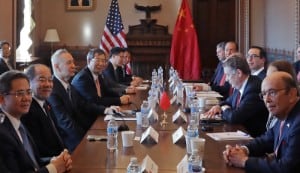
Trade correspondent L.C. reports:
The Trump Administration made it clear on February 7th that the summit between President Trump and President Xi Jinping expected later this month will not take place, at least not while the US President is in Asia for his February 27-28 meeting with Kim Jong Un.
The news took most observers – and the markets – by surprise. White House sources told reporters that the cancellation came because the two sides are too far from agreeing on basic issues for the two leaders to be able to consolidate a deal.
It is still assumed that the two leaders will meet at some time in the foreseeable future. The latest word is that this might happen at Mar-a-Lago as early as mid-March. But the question now is whether the March 1st deadline for the US to hike the tariff on $200 billion of imports from China from 10% to 25% will be honored or postponed. US Trade Representative Robert Lighthizer has been insisting the deadline won’t be extended in the absence of meaningful agreement on structural issues.
There was concern this week that President Trump is leaning toward accepting a deal based on increased Chinese purchases rather than one dealing with the underlying US complaints. But the president didn’t signal any softening in his State of the Union address.
The Chinese government meanwhile announced revisions of regulations affecting foreign investment in China. This is to meet an earlier promise to further open its financial sector. Beijing also reportedly agreed to include the problem of cyber-hacking in trade talks with Washington.
But two other high-profile issues could make it difficult for the two countries to settle their differences. First of all, there is the conflict over whether countries benefiting from US defense protection should be allowing China’s telecommunications champion, Huawei, to compromise the security of their communications infrastructures. China and Huawei have been cultivating decision makers in Europe with massive amounts of cash and investment inducements.
Secondly, there is the human rights issue of China’s concentration camps where one million Muslim Uighurs and other ethnic minorities are being held and submitted to beatings and brainwashing. Major Muslim governments have been largely silent regarding this outrage to their co-religionists, but Turkey has finally spoken up.
Focusing solely on trade issues, UNCTAD this week released a report that concludes that the US and China stand to both lose from their tariff war and that the top winners will be the EU, Japan, Mexico, and Canada. “Bilateral tariffs alter global competitiveness to the advantage of firms operating in countries not directly affected by them,” according to the report.
US-European alliance coming apart?
A danger has emerged to the US-EU trade talks and relationship. With the February 17th deadline for the Commerce Department to make its automotive Section 232 recommendations to the President, there is growing speculation that tariffs will be ordered and that the main target will be the EU. Comments this week by Gordon Sondland, US Ambassador to the EU, suggest Washington may be giving up on its expectations for fruitful talks and paving the way for imposing the auto tariffs.
Brussels agreed to enter trade talks with Washington largely because of the promise that auto tariffs would not be imposed on Europe as long as talks were going forward. Now, the US is complaining that before formal talks even begin, the EU is backtracking. “The good faith and understanding that existed” when Presidents Trump and Juncker met in July “has not been followed through on” by the EU, Sondland said in an interview with Politico published on February 6th. Sondland also claimed that there had been agreement to immediately work on reducing non-tariff barriers (e.g., regulations), but “a lot of talks” has led to “nothing of substance.” The US and EU also are seriously conflicted as to whether agriculture needs to be included in the trade negotiations.
Sondland warned Brussels against using Huawei technology for 5G networks, which some EU countries are preparing to do. Germany’s auction for 5G frequencies takes place in mid-March. In a separate communication he told European companies not to get around the sanctions on Iran, warning that anyone trading with Iran “other than humanitarian activity… won’t be doing any business with the US.”
The auto tariff threat
Speculation centers about the prospect that a 25% tariff will be imposed on European cars but not car parts. Other major car exporters to the US would be exempted, on the grounds that they have engaged in “good faith” trade talks – South Korea through the KORUS revision, Canada and Mexico through the USMCA, and Japan through the soon-to-begin talks for a bilateral deal. That would leave the Europeans, most especially the Germans, exposed.
The US has valid national security complaints against Germany. Besides its refusal to ban Huawei from its telecommunications infrastructure, it is not pulling its weight in NATO and is willing to subject Germany to Russian energy blackmail by going ahead with the Nordstream II pipeline.
Hitting assembled vehicles but not auto parts with tariffs would make sense given the dependence of US automakers on imported components. US automakers are already suffering from the tariff-provoked hike in steel and aluminum prices that doesn’t affect foreign-made cars, from rises in the price of imported parts from China hit with Section 301 tariffs, and from retaliatory tariffs hitting US car exports in markets like China (temporarily lifted).
But imposing new Section 232 tariffs on Europe risks provoking already-threatened retaliation and a WTO challenge. It would also disrupt the effort for US-EU cooperation necessary if China is to be compelled to make the structural changes that the US, EU, and other advanced sector countries are seeking.

Leave a Reply